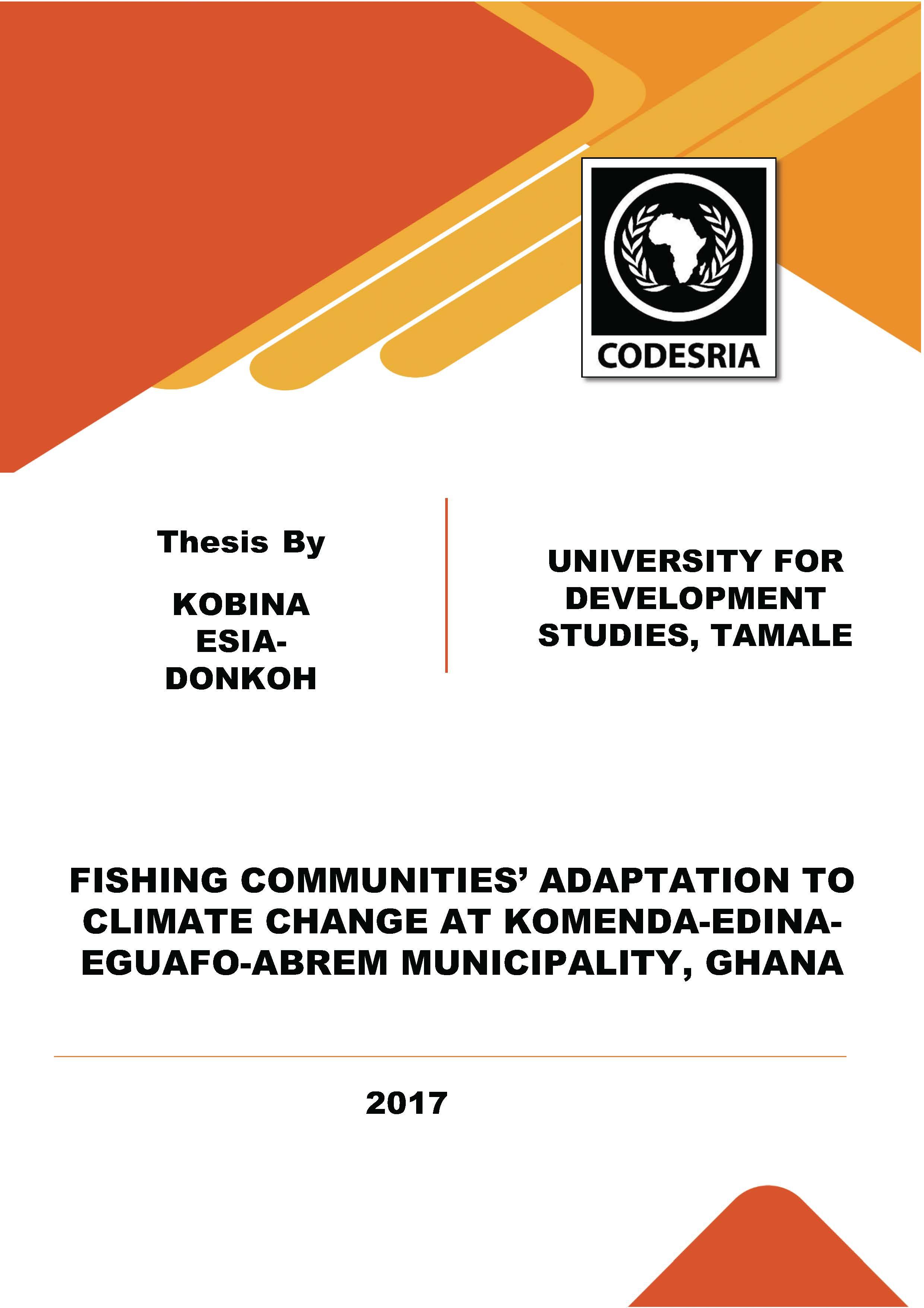Fishing communities' adaptation to climate change at Komenda-Edina-Eguapo-Abrem Municipality, Ghana
Keywords:
fishing, climate change, fishermen, adaptation to change, GhanaSynopsis
Adaptation to climate change in local contexts and fishing communities in Ghana has not received the desired attention even though these contexts are considered the mostat- risk and vulnerable. The objective of this study was to assess how fishing communities in the Komenda-Edina-Eguafo-Abrem Municipality adapt to climate change. The study was guided by the crisis management and timeline model, and the endogenous development adaptation system framework. Four fishing communities were purposively selected based on their community characteristics and observable evidence of a changing climate. Both primary and secondary data were collected for complementary reasons. Sixteen fishermen participated in in-depth interviews while 12 focus group discussions were conducted. In addition, a survey was conducted with 222 fishermen who had at least one decade or more experience in fishing and had stayed in their respective communities for two decades or more. A set of secondary data comprising temperature (1993-2011) and rainfall records (1980-2009), and satellite images of land cover change (1986-2002) from Landsat were also accessed. From observation and experiential knowledge, over 80 percent of the respondents expressed that temperatures and the sea level have increased while rainfall has decreased as observed over the last three decades. Spiritual factors were used to explain the reasons for the change in temperature, rainfall and sea level. The secondary data, however, did not show any consistent increase or decrease in temperatures and rainfall characteristics. Impacts of the changing climate were adverse on habitats, fish catch and indigenous knowledge in fishing. Temporary relocation, adaptive fishing practices and alternative livelihood strategies were implemented to adjust to the changing climate. These strategies reflected the local beliefs and practices in indigenous knowledge, although most of which did not yield the desired results expected. The co-evolution of knowledge and innovations towards adaptation to climate (based on the endogenous development adaptation system framework) was weak due to poor linkage between the indigenous and the conventional institutions. The Municipality and the local fisherfolks need to engage to develop a locally appropriate and applicable framework to guide and promote effective adaptation.
Downloads
References
Acheampong, P. K. (2016). The earth: Themes and variations. Cape Coast: UCC Press.
Achampong, E. K. (2012). The State of information and communication technology and health informatics in Ghana. Journal of Public Health Informatics, 4 (2), 1- 13.
Adams, F. G. (2009). Globalization, today and tomorrow. New York: Routledge.
Adger, W. N. (2003). Social capital, collective action, and adaptation to climate change. Economic Geography, 79, 387–404.
Adger, N. W., Agrawala, S., Mirza, M. Q. M., Conde, C., O’Brien, K., Pulhin, J., Pulwarty, R., Smit, B. & Takahashi, K. (2007). Assessment of adaptation practices, options, constraints and capacity. Climate change 2007: impacts, adaptation and vulnerability. In Parry, M.L., Canziani, O.F., Palutikof, J.P., van der Linden, P.J. and Hanson, C.E. (eds), Contribution of Working Group II to the Fourth Assessment Report of the Intergovernmental Panel on Climate Change. Cambridge: Cambridge University Press.
Adger, W. N., Arnell, N. W., & Tompkins, E. L. (2005). Successful adaptation to climate change across scales. Global Environment Change, 15, 77-86.
Addo. K. A., Larbi, L., Amisigo, B. & Ofori-Danso, P. K. (2011). Impacts of Coastal inundation due to Climate Change in a cluster of Urban Coastal Communities in Ghana, West Africa. Remote Sense, Journal of Coastal Research, 23(4),
-973.
Adu-buahen, A. (1966). Topics in West African history. London: Longman.
Agrawal, A., & Perrin. N. (2008). Climate adaptation, local institutions, and rural livelihoods: IFRI working paper w081-6. Ann Arbor, Michigan: International Forestry Resources and Institutions Program and University of Michigan.
Agyekum, G. A. (2016). Light fishing operations in small-scale fishing in Ghana- A case study of the Chorkor and Teshie-Nungua fishing communities in the Greater Accra Region of Ghana. Master Thesis in International Fisheries Management submitted to the Faculty of Biosciences, Fisheries and Economics.
Ajani, E. N., Mgbenka, R. N., & Okeke, M. N. (2013). Use of Indigenous Knowledge as a strategy for climate change adaptation among farmers in sub-Saharan Africa: Implications for policy. Asian Journal of Agricultural Extension, Economics & Sociology 2 (1), 23- 40.
Anim, D. O., Nkrumah, P. N., & David, N. M. (2013). A rapid overview of coastal erosion in Ghana.
International Journal of Scientific & Engineering Research, 4 (2), 1-7.
Ansu-Kyeremeh, K. (Ed.). (1998). Indigenous communication in Africa: Concept, applications, and prospects. Accra: Ghana University Press.
Apine, L. (2011). Residents' attitude towards possible adaptation measures to the sea coast erosion in Latvia. International Journal of Climate Change Strategies and Management, 3 (3), 238-249.
Appeaning-Addo, K. (2009). Detection of coastal erosion hotspots in Accra, Ghana. Journal of Sustainable Development in Africa, 4 (11), 253-258.
Arnstein, S. R. (1969). A Ladder of Citizen Participation. JAIP, 35 (4), 216-224.






